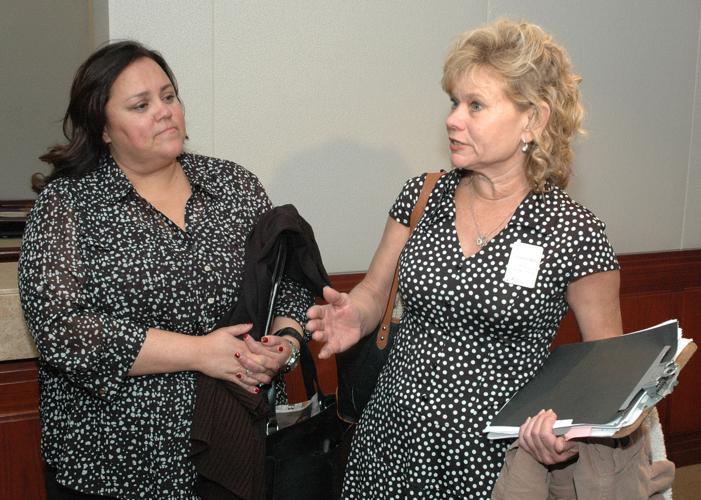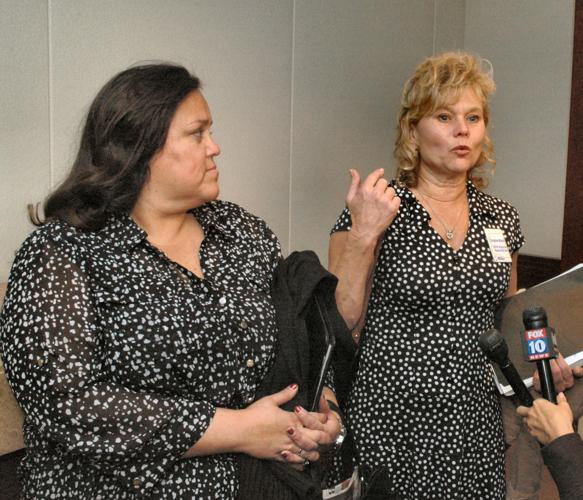PHOENIX — Two top teachers in Arizona want Gov. Doug Ducey to spend all of his new money for education on teacher raises, rather than spreading the cash around. They’re saying the governor’s current pay-hike proposal might be worse than nothing.
Ducey is giving their idea a chilly reception.
In a letter delivered to the Governor’s Office on Monday, Michelle Doherty, the 2017 Arizona Educational Foundation Teacher of the Year, and Christine Marsh, her 2016 counterpart, said teachers statewide could be given a 4 percent across-the-board pay raise this coming school year.
By contrast, Ducey is offering a 0.4 percent hike — averaging less than $200 a year — though he promises similar increases until that reaches 2 percent by 2020.
“It’s a step in the right direction,” Marsh said. “But that’s not going to solve any issues at all. It’s not going to keep teachers from leaving the profession or leaving the state.”
In fact, Marsh said, the “couple of dollars a day” in Ducey’s proposal may be worse than had he not said anything about teacher salaries at all.
“Quite frankly, I’m afraid (it) is going to have the opposite effect and drive teachers out,” she explained. “If they think to themselves, ‘This is what the governor means when he’s going to help education, I’m out.’”
The governor’s proposed budget identifies $114 million in new dollars for education. Of that, $13.6 million is earmarked for salary increases.
Other allocations would go to full-day kindergarten in the poorest areas of the state, signing bonuses for new teachers who agree to work in areas of high poverty, loan forgiveness for those who agree to teach math, science and special education, and bonuses for schools whose students, on average, score in the top 10 percent statewide in the AzMERIT test.
Doherty and Marsh would not touch the $17 million the governor has set aside for school construction and repairs.
But that leaves about $95 million they figure could be added to teacher raises.
Marsh said the other things Ducey wants to fund also are important.
“But if we don’t have qualified teachers in the classroom, then these other issues kind of don’t matter,” she said.
The teachers also say there’s easily another $12.4 million available. That’s the increased amount that corporations will be able to divert next school year from what they owe the state in income taxes, to instead go to scholarships to help students attend private and parochial schools.
Companies already are claiming close to $62 million in such credits. That $12.4 million reflects current law increasing that figure automatically next year — and every year — by another 20 percent. So, if left undisturbed, that would increase to nearly $87 million the following year, $104 million the year after, and so on.
Doherty and Marsh’s proposal would cap the annual increase at no more than inflation, or about $1 million.
Ducey told Capitol Media Services he’s “always open-minded and willing to listen to our great, dedicated teachers.” And he acknowledged the shortage of teachers and the role that money plays.
But he defended earmarking some of the available cash to go to other programs. “I also am concerned about our kids, especially our kids in low-income areas,” he said. “We’re trying to address both these issues in a thoughtful, positive way.”
Ducey suggested that educators should be standing behind his plan, saying things could be worse — and may be if the Legislature pares his proposal.
“I also hear a lot of discussion about people who think maybe we don’t have the money or we’re spending too much (on new education spending),” the governor said. “I want our teachers to wake up every day trying to move this budget forward.”
Ducey also said the question of higher teacher pay is not totally dependent on what’s in his budget.
He pointed out that voter approval last year of Proposition 123 will mean an additional $318 million going to public schools this year, about $280 a student. “I also want to challenge our superintendents across the state. They are more than welcome to take those dollars and put those into teachers’ raises,” Ducey said.
The ballot measure, however, does not represent an increase in baseline funding, but simply settled a 2010 lawsuit filed by schools when lawmakers ignored a voter-approved mandate to increase basic state aid to schools every year at least as much as inflation. The settlement amount approved by voters — about $3.5 billion over the next decade — represents only a portion of how much schools said they were owed.
The governor specifically said he is not particularly interested in scaling back the increase in the amount of money corporations can give for private and parochial school scholarships instead of putting the money into the state general fund. “Parental choice is important in a state like ours,” Ducey said.
He said there’s “a lot of good news” in his $9.78 billion budget proposal for public education.
“At the same time, having an environment in education where there are options for our parents where they can send their child to the school of their choice is important,” he said.





